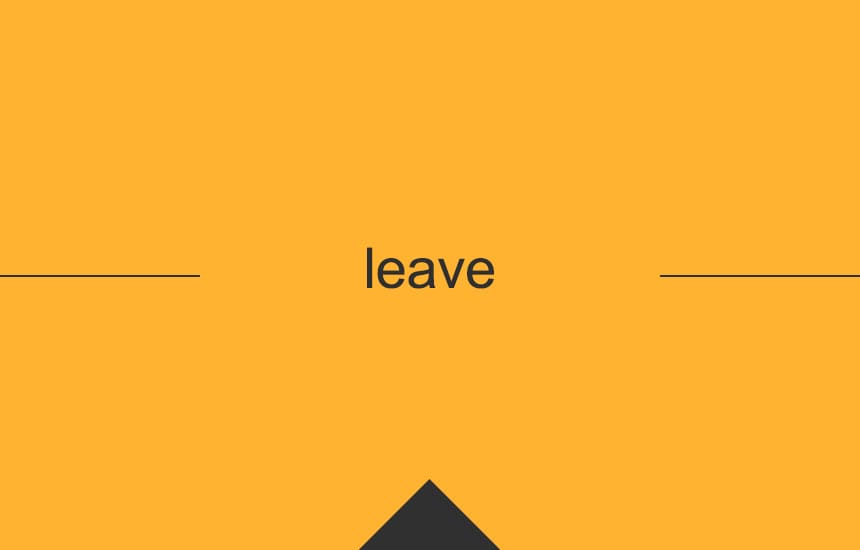定義 / Definition
[verb]
・to go away from, depart from
・allow or cause to remain.
・cause (someone or something) to be in a particular state or position.
・(of a plant) put out new leaves.
[noun]
・(in snooker, croquet, and other games) the position in which a player leaves the balls for the next player.
・time when one has permission to be absent from work or from duty in the armed forces.
・permission.
— その他 例文 —
We left London for Paris.
我々はロンドンを離れてパリに向かった
Our flight leaves at 11:45.
私たちが乗る飛行機は11時45分に出発する。
I’m leaving for Paris tomorrow morning.
私は明日の朝、パリへ向けて出発します。
He picked himself up and left the room.
彼は起き上がって部屋を出て行った。
I realized that I had left my umbrella in his car.
彼の車の中にかさを置き忘れたことに気づいた。
He could have left his umbrella in the shop.
彼はその店にカサを忘れたのかもしれない。
Please go away and leave the two of us alone.
どうかあっちへ行って、私たちを2人だけにしてください。
I am leaving early tomorrow, so I will put out my clothes now.
明日は家を出る時間が早いので、今のうち服を出しておこう。
The math problem left him astonished.
その数学の問題は彼を驚かせたままにしました。
Randolph always leaves the house clean.
ランドルフは部屋をきれいな状態にしています。
The boss left the employees busy.
その上司は従業員たちを忙しいままにしました。
The argument left them angry.
口論は彼らを怒らせたままにしました。
The bleach left the clothes colorless.
漂白剤が衣服を退色させました。
The concert left us elated.
演奏会は私たちの心を弾ませました。
The children often leave the room messy.
子どもたちはしばしば部屋を散らかしたままにします。
Sydney always leaves the fridge empty.
シドニーはいつも冷蔵庫を空にしたままです。
Her words left Harry cold.
彼女の言葉はハリーの興味を引きませんでした。
She leaves me bewitched.
彼女は私をうっとりさせます。
A good fabric softener will leave the wash fluffy.
よい柔軟剤は洗濯物をふわふわの状態にするでしょう。
Drinking the strong French wine for dinner left me dizzy.
夕食に度数の強いフランス産ワインを飲んで私はめまいがしました。
Anette left the wood of the oak table highly polished.
アネッテはオーク製のテーブルをみがきあげてピカピカな状態にしました。
The minister’s eloquent words left the congregation ecstatic.
大臣の雄弁な言葉に集まった人たちは興奮したままでした。
The professor’s profound lectures leave me impressed.
教授の深遠な講義に私は感銘を受けっぱなしです。
Even though Samuel was told many times to get busy he left his work incomplete.
サミュエルは何度も仕事に取りかかるように言われたにもかかわらず、仕事を中途半端なままにしました。
A long day’s travel without rest and with little food might leave you grouchy.
休憩なしで食べ物のほとんどない旅はあなたを不機嫌にさせるかもしれません。
The surgeon’s skillful work during the long operation left the patient grateful.
その外科医の長時間の手術における熟練した技術に対して患者は感謝の念でいっぱいでした。
The mention of snakes or spiders or toads always leaves Ellen fearful.
へび、くも、ひきがえるの話題はいつもエレンを怖がらせます。
The sudden drop in temperature in the middle of January left the lake completely frozen.
1月半ばの突然の気温低下によって湖は完全に凍った状態になりました。
Forgetting the words to a speech in front of a large audience leaves us flustered.
大勢の聴衆の前で演説の言葉を忘れることは私たちを当惑させます。
Writing the Harry Potter series of books left J.K.Rowling fabulously wealthy.
ハリー・ポッターの本を書いたことでJ.K.ローリングは驚くほど裕福になりました。
The monks left the long, red candles next to the high altar still flickering.
修道士はまだチラチラと燃えている長い赤いろうそくを祭壇の隣におきました。
Looking at the way the super-rich live leaves many people envious.
超お金持ちの生活の仕方を見ることは多くの人びとをうらやましがらせます。
The boys’ carefree way of playing outside leaves their blue jeans frayed and dirty.
少年たちの外でのぞんざいな遊び方のせいで彼らの青いシーンズはぼろぼろで汚くなってしまいます。
![英語・英会話の効果的な学習法|PM English[全無料] 英語・英会話の効果的な学習法|PM English[全無料]](https://pm-school.info/english/wp-content/uploads/2021/11/logot.png?1770976143)
















![中学英語やり直し[中学英文法 基礎確認問題]](https://pm-school.info/english/wp-content/uploads/2023/09/kiso-1-150x150.jpg)
![中学英語やり直し[中学英文法の基礎確認問題]](https://pm-school.info/english/wp-content/uploads/2023/09/kisokakunn-150x150.jpg)
![中学英語やり直し[関係代名詞と接続詞のthatの違い]](https://pm-school.info/english/wp-content/uploads/2023/09/kankei-setuzoku-150x150.jpg)
![中学英語やり直し[中学英語の復習問題]](https://pm-school.info/english/wp-content/uploads/2023/09/kiso-150x150.jpg)
![中学英語やり直し[基礎英文法の復習問題]](https://pm-school.info/english/wp-content/uploads/2023/09/fukusyuumondai-150x150.jpg)









![[列車 電車]に関わる英語の表現を学ぼう](https://pm-school.info/english/wp-content/uploads/2022/11/train-150x150.jpg)



![英語・英会話の効果的な学習法|PM English[全無料] 英語・英会話の効果的な学習法|PM English[全無料]](https://pm-school.info/english/wp-content/uploads/2021/11/logom.png?1770976143)